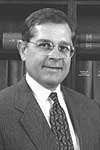Renowned scientist, physician to head BSD
By John EastonMedical Center Public Affairs
 James Madara |
On Wednesday, Dec. 12, his appointment freshly approved by the Executive Committee of the University Board of Trustees that afternoon, James Madara, the new Dean of the Biological Sciences Division, was introduced at the division’s quarterly staff meeting by President Randel.
Madara, 51, is one of the nation’s foremost academic pathologists and an authority on epithelial cell biology and gastrointestinal disease. He will become the new Dean of the Division of the Biological Sciences and the Pritzker School of Medicine and Vice President for Medical Affairs, effective July 1.
“Dr. Madara brings to the University a distinguished academic career and a deep knowledge of the clinical environment that, together, equip him ideally to lead our scientific and medical enterprise in ways that capture the virtues of our unique structure,” said Randel. “I am confident that under his leadership we will enter a period of renewed excellence and vigor across the whole range of activities in the biological sciences and medicine.”
Madara is currently the William Patterson Timmie professor and chairman of the department of pathology and laboratory medicine at Emory University Medical School in Atlanta, Ga. He already has begun to undertake his new responsibilities, however, flying back and forth every other week and staying in steady phone contact while wrapping up responsibilities in Atlanta.
“I will be visiting regularly until my arrival in July,” he told his audience, “but let me assure you the commitment is there. I intend this journey to lead to someplace good.”
Michael Riordan, President of the University Hospitals, who also came to Chicago from Emory, said of Madara’s appointment, “We are pleased to have someone with such an outstanding record of academic and clinical leadership and a talent for combining basic research with clinical medicine.”
Once introduced and applauded, Madara immediately declared his intentions. In a brief talk to the BSD staff, he emphasized the central importance of scholarship in all decisions facing the division, the need for fairness in a time of limited resources and the growing role of collegiality, as researchers from many divisions work together on common problems. He also added that he plans to recruit 30 new basic science faculty members for the BSD.
A distinguished scientist himself, Madara has made important contributions to understanding the biology of the cells that line the digestive tract. He has elucidated, at the molecular level, how these cells permit the absorption of nutrients while serving as a barrier to intestinal bacteria, and how these cells help regulate the immune response to normal and disease-causing bacteria. This research has been crucial to understanding infectious diseases that affect the intestines, to treating inflammatory disorders such as ulcerative colitis or Crohn’s disease, and to improving drug delivery.
In recognition of his research, Madara received the 1990 Warner-Lambert/Parke-Davis Award from the American Association of Pathologists, the 1991 Physician Scientist Award from the American Gastroenterological Association, and the 1994 International State-of-the-Art Lectureship by the British Society of Gastroenterology. In 1997, he was elected to the Association of American Physicians and received a prestigious MERIT Award from the National Institutes of Health. He currently serves on the editorial boards of several scientific journals and is the editor in chief of the American Journal of Pathology.
Madara graduated from Hahnemann Medical College in Philadelphia in 1975, completed residency and research training in pathology at Harvard Medical School’s New England Deaconess and Peter Bent Brigham Hospitals and joined the faculty at Brigham and Women’s Hospital in 1980, serving as director of the division of gastrointestinal pathology. In 1993, he was appointed professor of pathology at Harvard Medical School, and from 1994 until 1997, when he left Harvard for Emory, he served as director of the Harvard Digestive Diseases Center.
“All great institutions go through peaks and mild troughs,” said Madara at the end of his inaugural talk. “But it was people and culture that brought us here, and because of that, I see us flourishing. This is a strong division in a great research university.”
![[Chronicle]](/images/small-header.gif)